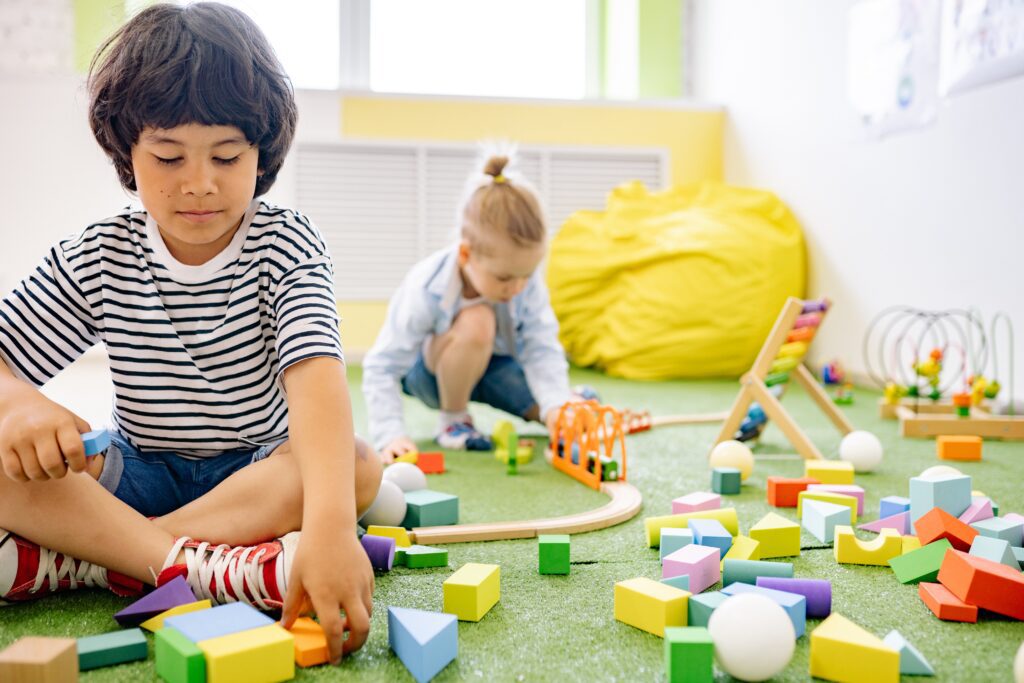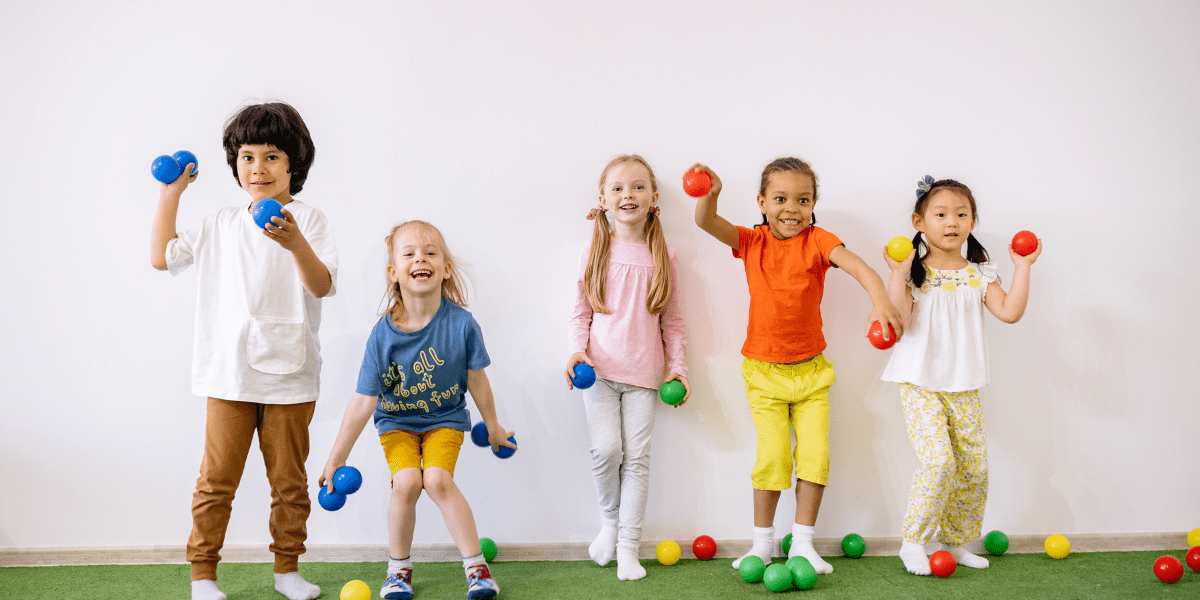Preschoolers are children between the ages of 3 and 5, typically before they start formal schooling. This is a time of rapid growth and development, both physically and cognitively. Preschoolers are becoming more independent and curious about the world around them. They are developing their language skills, imagination, and social skills.
Preschoolers learn best through play and exploration, so it’s important to provide them with plenty of opportunities for hands-on activities and open-ended play. They also benefit from structured activities that teach basic academic skills, such as counting, letter recognition, and early literacy.
Preschoolers thrive on routine and consistency, and they feel secure when they know what to expect. Positive reinforcement, such as praise and encouragement, is important in promoting self-esteem and confidence.
Overall, the preschool years are a crucial time in a child’s development and lay the foundation for their future academic and social success.

10 of the best things to do for preschoolers
- Read to them every day: Reading is a great way to stimulate a child’s imagination and language development.
- Encourage creativity through play: Give your child toys that encourage imaginative play, like building blocks, art supplies, or dress-up clothes.
- Allow for unstructured playtime: Kids need time to play freely and use their imaginations without any particular goal or outcome in mind.
- Teach basic social skills: Help your child learn how to share, take turns, and be kind to others.
- Foster independence: Encourage your child to do things on their own, like getting dressed or setting the table.
- Practice fine motor skills: Help your child develop their hand-eye coordination through activities like drawing, cutting, and stringing beads.
- Develop gross motor skills: Encourage physical activity through activities like running, jumping, and climbing.
- Expose them to new experiences: Take your child to new places, like museums, parks, and other cultural events.
- Practice basic academic skills: Teach your child the basics of letters, numbers, and shapes through fun activities like singing songs or playing games.
- Establish a routine: Children thrive on routine, so establish a consistent schedule for meals, naps, and bedtime to help them feel secure and develop good habits.
10 things that are not recommended for preschoolers
- Expose them to inappropriate media: Avoid exposing preschoolers to violent, sexual, or other inappropriate media content.
- Over-schedule their time: Don’t fill a preschooler’s day with too many structured activities, as they need unstructured playtime to foster creativity and imagination.
- Use physical punishment: Physical punishment can be harmful to a child’s mental and emotional health, and it is not an effective way to discipline young children.
- Dismiss their feelings: Don’t dismiss a preschooler’s feelings or emotions, as it can lead to a lack of emotional regulation and poor social skills.
- Ignore their basic needs: Make sure preschoolers have access to healthy food, water, and plenty of restful sleep.
- Expect too much too soon: Don’t push preschoolers to achieve milestones or academic goals that are beyond their developmental level.
- Use negative reinforcement: Avoid using negative reinforcement, such as criticism or punishment, as it can damage a child’s self-esteem and motivation.
- Isolate them from social interactions: Preschoolers need social interactions with peers and adults to develop social skills, so avoid isolating them from these opportunities.
- Neglect their safety: Make sure preschoolers are in safe environments and are supervised at all times to prevent accidents or injury.
- Label them negatively: Avoid labeling preschoolers with negative labels, such as “bad” or “naughty,” as it can impact their self-image and lead to behavior problems.
Preschoolers Development area
Preschoolers undergo significant growth and development in multiple areas, but here are the main development areas:
- Physical development: Preschoolers continue to refine their motor skills, both gross and fine motor, through activities like running, jumping, climbing, drawing, and using scissors. They also develop hand-eye coordination and body awareness.
- Cognitive development: Preschoolers become more curious about the world around them and learn through play and exploration. They begin to develop basic academic skills, such as counting, letter recognition, and early literacy.
- Language development: Preschoolers are developing their language skills rapidly, with an increased vocabulary and sentence structure. They also learn to communicate their emotions and needs effectively.
- Social and emotional development: Preschoolers learn to regulate their emotions, form relationships with peers and adults, and begin to understand social rules and expectations. They also develop self-esteem and self-awareness.
- Creative development: Preschoolers explore their creativity through play and art, developing their imagination, and self-expression.
Scientific-based pieces of advice for preschoolers
- Encourage unstructured playtime: Unstructured playtime is essential for preschoolers as it helps them develop creativity, imagination, and social skills. Let them play freely with toys like building blocks, dress-up clothes, or art supplies.
- Read to them every day: Reading to preschoolers is an excellent way to promote language development and a love for learning. Choose books that are age-appropriate and engaging.
- Promote physical activity: Preschoolers need plenty of physical activity to promote physical development, coordination, and a healthy lifestyle. Encourage outdoor play, dancing, and other activities that get them moving.
- Limit screen time: Excessive screen time can have a negative impact on preschoolers’ cognitive, social, and emotional development. Limit screen time to no more than one hour per day and choose age-appropriate educational programs.
- Foster independence: Encourage preschoolers to do things on their own, like dressing themselves or setting the table. This promotes confidence and independence.
- Practice positive reinforcement: Praise and positive reinforcement are effective ways to encourage good behavior and build self-esteem in preschoolers. Avoid criticism or punishment, as it can have a negative impact on their emotional development.
- Provide a stable and nurturing environment: Preschoolers thrive in a stable and nurturing environment. Be consistent in routines, show affection, and respond promptly to their needs.
- Encourage social interactions: Social interactions with peers and adults are essential for preschoolers’ social and emotional development. Encourage playdates, social activities, and positive relationships.
- Foster a love of learning: Encourage curiosity and a love of learning by providing age-appropriate educational activities, such as puzzles, games, and experiments.
- Practice mindfulness: Mindfulness practices like deep breathing and relaxation techniques can help preschoolers regulate their emotions, reduce stress, and improve focus and attention.
Some common doctors’ advice for preschoolers:
- Vaccinations: Ensure your child is up-to-date on all recommended vaccinations to prevent illnesses.
- Regular check-ups: Schedule regular check-ups with a pediatrician to monitor your child’s growth, development, and overall health.
- Healthy diet: Provide a balanced diet with a variety of fruits, vegetables, whole grains, and protein sources. Limit sugary and processed foods and encourage drinking plenty of water.
- Good sleep habits: Preschoolers need 10-13 hours of sleep per day, including nap time. Establish a consistent bedtime routine and ensure the sleeping environment is quiet, dark, and comfortable.
- Regular exercise: Encourage physical activity to promote healthy growth and development. Make sure to provide safe play environments and supervise outdoor activities.
- Dental care: Promote good dental hygiene, including brushing teeth twice a day, flossing, and regular dental check-ups.
- Safety: Ensure your child is in a safe environment at all times, with proper supervision and age-appropriate safety measures.
- Sun protection: Protect your child from the sun by applying sunscreen, wearing protective clothing, and limiting sun exposure during peak hours.
- Mental health: Monitor your child’s mental and emotional health and seek professional help if necessary. Promote healthy coping strategies and encourage communication about feelings and emotions.
- Positive reinforcement: Use positive reinforcement to encourage good behavior and promote self-esteem. Avoid negative reinforcement, such as punishment or criticism, which can have a negative impact on your child’s mental and emotional health.
Education based advice for preschoolers
- Promote a love of learning: Encourage curiosity and a love of learning by providing age-appropriate educational activities, such as books, puzzles, educational games, and experiments.
- Read to them every day: Reading to preschoolers is an excellent way to promote language development and a love for learning. Choose books that are age-appropriate and engaging.
- Encourage exploration: Preschoolers learn through play and exploration. Provide opportunities for them to explore the world around them, ask questions, and experiment.
- Foster independence: Encourage preschoolers to do things on their own, like dressing themselves or setting the table. This promotes confidence and independence.
- Provide a stimulating environment: Create a stimulating environment that encourages learning, such as a playroom with age-appropriate educational toys and games.
- Encourage creativity: Preschoolers explore their creativity through play and art, developing their imagination and self-expression. Provide art supplies and encourage creativity.
- Provide structure and routine: Preschoolers thrive on structure and routine. Establish a consistent routine for meals, playtime, and bedtime.
- Monitor screen time: Limit screen time to no more than one hour per day and choose age-appropriate educational programs.
- Foster social interactions: Social interactions with peers and adults are essential for preschoolers’ social and emotional development. Encourage playdates, social activities, and positive relationships.
- Support their interests: Pay attention to your child’s interests and support them by providing opportunities for learning and exploration in those areas.
Educational patterns available for preschoolers
The educational pattern or approach for preschoolers is commonly referred to as a “pedagogy.” Pedagogy is the theory and practice of education, particularly in relation to children. The different educational patterns for preschoolers that I mentioned earlier, such as play-based learning, Montessori method, Reggio Emilia approach, Waldorf method, HighScope method, Bank Street approach, and project-based learning, are all examples of different pedagogies that are used in preschool education. Each pedagogy has its own unique approach to teaching and learning, and the choice of pedagogy will depend on the goals and values of the parents and educators, as well as the needs and learning style of the child.
- Play-Based Learning: Play-based learning is a child-centered approach that uses play as a way of learning. It allows preschoolers to explore and discover their environment through hands-on activities and play.
- Montessori Method: The Montessori Method is a child-centered educational approach that emphasizes self-directed learning and hands-on experiences. It focuses on individual learning, and children learn at their own pace.
- Reggio Emilia Approach: The Reggio Emilia Approach is a child-centered approach that emphasizes child-directed learning and encourages children to express themselves through art and other forms of creative expression.
- Waldorf Method: The Waldorf Method is a holistic approach that emphasizes imagination, creativity, and hands-on learning. It integrates art, music, and movement into the curriculum to promote a well-rounded education.
- HighScope Method: The HighScope Method is a child-centered approach that emphasizes active learning and hands-on experiences. It focuses on problem-solving and decision-making, and children learn through a combination of teacher-directed and child-initiated activities.
- Bank Street Approach: The Bank Street Approach is a child-centered approach that emphasizes social and emotional development. It focuses on individual learning and encourages children to learn through play and exploration.
- Project-Based Learning: Project-based learning is a child-centered approach that focuses on problem-solving and critical thinking. It allows preschoolers to work on projects that are meaningful to them, and it integrates different subject areas into the curriculum.
Which Education pattern is good
There is no one-size-fits-all answer to which educational pattern is good for preschoolers, as each child is unique and has their own learning style and needs. The best educational pattern for a preschooler will depend on a variety of factors, including their personality, learning style, and interests, as well as the goals and values of the parents and educators.
Some parents may prefer a play-based approach that emphasizes exploration and discovery, while others may prefer a more structured approach that focuses on academic skills. It is important to research different educational patterns, visit schools or centers that use these patterns, and talk to educators and other parents to determine which approach is best suited for your child.
It is also worth noting that many schools and preschool programs incorporate elements from multiple educational patterns to create a unique curriculum that meets the needs of their students. Ultimately, the most important thing is to choose an educational pattern or approach that fosters your child’s curiosity, encourages their love for learning, and promotes their social and emotional development.
List of the major educational boards in India:
- Central Board of Secondary Education (CBSE)
- Indian Certificate of Secondary Education (ICSE)
- State Boards of Education (such as Maharashtra State Board of Secondary and Higher Secondary Education, Tamil Nadu State Board, etc.)
- International Baccalaureate (IB)
- Cambridge International Examinations (CIE)
- National Institute of Open Schooling (NIOS)
- International General Certificate of Secondary Education (IGCSE)
These are the major boards in India that provide primary and secondary education to students. Each of these boards has its own syllabus, curriculum, and assessment system, and the choice of board will depend on the goals and values of the parents and students, as well as the educational opportunities available in their region.
Overview of the major educational boards in India and the approximate number of students studying under each board
- Central Board of Secondary Education (CBSE): The CBSE is a national board of education in India that conducts the Class 10 and Class 12 board exams for schools affiliated with it. It is one of the largest educational boards in India and has around 20,000 schools affiliated with it, with approximately 25 million students.
- Indian Certificate of Secondary Education (ICSE): The ICSE is a board of education that conducts the Class 10 board exams for schools affiliated with it. It is a private board and is known for its comprehensive and balanced syllabus that includes both theory and practical components. There are around 2,000 schools affiliated with the ICSE board, with approximately 200,000 students.
- State Boards of Education: Each state in India has its own board of education that conducts the Class 10 and Class 12 board exams for schools affiliated with it. These boards are responsible for setting the syllabus and conducting the exams, and the curriculum may vary from state to state. The number of students studying under state boards varies widely depending on the state, but overall, the majority of students in India study under state boards.
- International Baccalaureate (IB): The IB is an international board of education that offers a globally recognized curriculum for students aged 3 to 19. The IB curriculum is focused on developing critical thinking, creativity, and communication skills, and is offered in more than 150 countries worldwide. In India, there are around 200 schools affiliated with the IB, with approximately 30,000 students.
- Cambridge International Examinations (CIE): The CIE is a board of education that offers internationally recognized qualifications for students aged 5 to 19. The CIE curriculum is focused on developing critical thinking, problem-solving, and communication skills, and is designed to prepare students for higher education and employment. In India, there are around 500 schools affiliated with CIE, with approximately 50,000 students.
- National Institute of Open Schooling (NIOS): The NIOS is an open school that offers distance education for students who are unable to attend regular school. It is a national board of education that offers secondary and senior secondary courses, and has around 3.5 million students enrolled.
- International General Certificate of Secondary Education (IGCSE): The IGCSE is a globally recognized board for secondary education offered by the Cambridge Assessment International Education (CAIE). In India, many international schools offer the IGCSE curriculum, and the number of students studying under the IGCSE board is estimated to be around 30,000 to 40,000.
The data I provided is based on the most recent available information as of my knowledge cutoff date, which is September 2021. However, the numbers may have changed since then due to various factors such as fluctuations in enrollment numbers or changes in board affiliations. It’s important to note that the numbers I provided are estimates and may not be completely accurate.
Schools affiliated with each board on their respective official websites, which I have listed below
1. Central Board of Secondary Education (CBSE): https://www.cbse.gov.in/cbseweb/schools.html
2. Indian Certificate of Secondary Education (ICSE): https://www.cisce.org/school-search.aspx
3. State Boards of Education: Information on state board schools can be found on the respective state board’s official website
- The website for the Tamil Nadu State Board of Secondary Education is http://www.dge.tn.gov.in/. This website provides information on the board’s policies, programs, examinations, results, and other related resources. Additionally, the website also provides links to various services, such as online registration, exam centers, and certificate verification.
- The website for the Karnataka State Board of Secondary Education is https://kseab.karnataka.gov.in/english This website provides information on the board’s activities, programs, policies, and results. It also includes details about the board’s examinations, registration, and syllabus. Additionally, the website also provides links to various services, such as online registration, examination centers, and certificate verification.
- The website for the Kerala State Board of Education is http://kbpe.org/. This website provides information on the board’s policies, programs, and activities. It also includes details about the board’s examinations, syllabus, and results. Additionally, the website provides links to various services, such as online registration, examination centers, and certificate verification.
- The website for the Andhra Pradesh Board of Secondary Education is https://www.bse.ap.gov.in/. This website provides information on the board’s policies, programs, and activities. It also includes details about the board’s examinations, syllabus, and results. Additionally, the website provides links to various services, such as online registration, examination centers, and certificate verification.
- The website for the Telangana State Board of Intermediate Education is https://tsbie.cgg.gov.in/. This website provides information on the board’s policies, programs, and activities. It also includes details about the board’s examinations, syllabus, and results. Additionally, the website provides links to various services, such as online registration, examination centers, and certificate verification.
- The official website for the Maharashtra State Board of Secondary and Higher Secondary Education is https://mahahsscboard.in/. This website provides information about the board’s policies, programs, and activities. It also includes details about the board’s examinations, syllabus, and results. Additionally, the website provides links to various services, such as online registration, examination centers, and certificate verification.
- The Delhi state government has its own education board called the Directorate of Education (DOE). The official website of the Directorate of Education is http://www.edudel.nic.in/. This website provides information about various education-related schemes, policies, programs, and activities initiated by the Delhi government. It also includes details about the DOE’s curriculum, textbooks, and examination system. Additionally, the website provides links to various services, such as online admissions, scholarship schemes, and teacher training programs.
4. International Baccalaureate (IB): https://www.ibo.org/school/search/index.cfm?programmes=&country=IN®ion=&find_schools=Find
5. Cambridge International Examinations (CIE): https://www.cambridgeinternational.org/find-a-centre/find-an-exam-centre/
6. National Institute of Open Schooling (NIOS): https://www.nios.ac.in/study-center.aspx
7. International General Certificate of Secondary Education (IGCSE): Information on IGCSE schools in India can be found on the Cambridge Assessment International Education website, https://www.cambridgeinternational.org/programmes-and-qualifications/cambridge-upper-secondary/cambridge-igcse/where-can-i-take-cambridge-igcse/.




